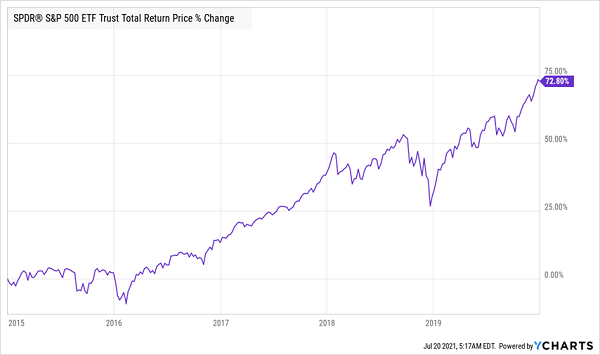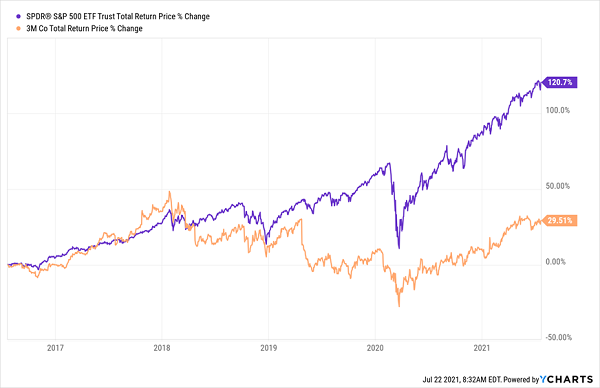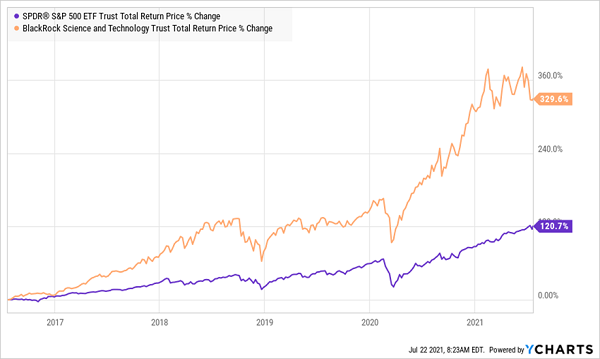Markets took a dive (then posted a lightning-fast recovery) last week, a return to volatility that’s a good reminder to cast an eye over our dividend portfolios.
One thing to pay particular attention to is the amount of cash you’re holding. Because if you’re like many investors I’ve talked to recently, you’re holding too much of it—and that can cause a steady wealth drain that bleeds away thousands in returns every year!
Taking Money Off the Table—at Exactly the Wrong Time
Of course, having a healthy cash cushion is always a good thing. The trouble for most folks, though, is that they’ve been growing the amount of cash they have outside the market just as stocks have taken off. Investment juggernaut Vanguard’s “How America Invests 2020” report found that 21% of US household income was sitting in cash, up dramatically from 15% five years earlier.
Worse, the average investor left even more money on the table by going aggressively into cash in 2018 and 2019, just when a pivot to stocks would have been even more profitable, with 12.5% annualized returns. Look at those two years on the right-hand side of the table below.
Sideline Sitters Miss Big Gains (and Dividends)

In all, if you’d held $100K in cash these past five years, you missed out on a $72,800 gain. In fact, due to inflation, you would have gone backwards and would be sitting on significantly less than $100K in purchasing power today.
The bottom line? Keep a reasonable cash reserve—but always make sure the bulk of your portfolio is in investments that send dividends your way and set you up for gains, as well.
CEFs, Not ETFs, Are Your Best Play for the Back Half of 2021 (and Beyond)
We have every reason to believe that keeping a big cash holding—or adding to it—will continue this pattern of lost gains and dividends, especially as rising corporate earnings, along with expanded distribution of vaccines worldwide, continue to give stocks a tailwind.
As members of my CEF Insider service know, our best option for buying stocks is through closed-end funds (CEFs). Not only do CEFs regularly outperform their benchmarks, they also pay high dividends: the typical CEF yields 6.3% as I write this, and several pay a lot more.
The key to these funds’ outperformance is another factor that often gets ignored as investors rush to low-fee ETFs (including the ones Vanguard manages): active management.
Consider the ETF just about everyone knows about: the SPDR® S&P 500 (NYSE:SPY). It’s a simple, low-fee way to hold all the stocks in the S&P 500, because its algorithm is set up to simply track the index. So you can take solace in the fact that you’ll never underperform. The tradeoff? You’ll never outperform, either!
In addition, because of SPY’s mandate to track the index, it’s forced to hold some real duds just because they happen to be S&P 500 constituents, like industrials giant 3M (NYSE:MMM), which was in the index until earlier this year. The stock has dragged down the S&P 500 a lot in the recent past—and has returned just 30% in gains and dividends in the last five years, in a time when the S&P 500 has returned four times as much.
Index Funds Include Weak Growers Like This

But CEFs like the BlackRock Science and Technology Trust (NYSE:BST)did a great job of avoiding duds like 3M, giving shareholders far superior returns over that five-year period:
Crushing the Index By Avoiding the Laggards

If you’ve never heard of BST, it’s a CEF that plays mainly in the large-cap tech space, with top-10 holdings that include mainstays like Apple (NASDAQ:AAPL), Microsoft (NASDAQ:MSFT) and Amazon (NASDAQ:AMZN), as well as e-commerce firms like Mastercard (NYSE:MA), Square (NYSE:SQ) and PayPal (NASDAQ:PYPL).
These are all companies that cashed in as we all holed up with our gadgets during the pandemic, and they’re well positioned to cash in as reopenings continue, driving retail sales higher.
The CEF is just one of many such funds that’s beaten the index while also paying much higher yields than your average stock. Its 5.1% payout is far more than SPY’s 1.3%, and it’s just the start: many of BST’s peers offer far bigger payouts.
Disclosure: Brett Owens and Michael Foster are contrarian income investors who look for undervalued stocks/funds across the U.S. markets. Click here to learn how to profit from their strategies in the latest report, "7 Great Dividend Growth Stocks for a Secure Retirement."
